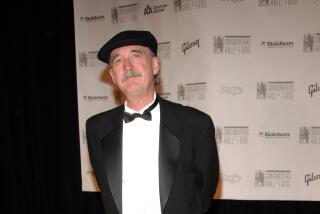The Genius That Was Will Rogers : Tribute: Can it be 60 years since he died? It seems like just yesterday that he was spinning tales for the common man.
- Share via
Patty Stephenson will always remember the last time she saw Will Rogers.
She had dropped by his Pacific Palisades home, as she did frequently in those days, as the humorist and folk hero was preparing to leave for Alaska on the journey that would end in his death in a plane crash on Aug. 15, 1935.
“He was really excited about that trip,” she recalled. “He had been talking about it all week.”
The approaching 60th anniversary of Rogers’ death is prompting a new outpouring of remembrances for the plain-spoken voice of the common man. At his ranch, now a state historic park, as well as in Alaska, Colorado and his native Oklahoma, fans young and old will gather in his honor.
It is a poignant counterpoint to the events to realize that the sands of time are closing around his memory. Soon he will belong to history. But to those who knew him, he’s still very much alive.
Stephenson, daughter of actress Billie Burke and the vaudeville impresario Florenz Ziegfeld, was a close friend of the family. She and Rogers’ daughter, Mary, were good friends, as were her mother and Rogers’ wife, Betty.
“Aunt Betty always treated me like another daughter. I had free rein of the house,” Stephenson said. “Everything was pretty informal. I would go over and sometimes I’d find him upstairs writing his daily [column]. I wouldn’t disturb him then. Sometimes he would be outside and he’d slap me on the back and say, ‘Are you going to go riding today?’
“He had a little pony, Pumpkin, that was always mine to ride when I wanted to,” recalled Stephenson, who is now 79 and lives in Brentwood. “We had a lot of fun at the ranch in those days.”
In his day, Rogers was among the world’s best-known celebrities. Yet he was a familiar and accessible figure to Southern Californians who encountered him at rodeos, ballgames, airfields or hundreds of after-dinner speeches.
Once, in 1929, he visited Pasadena City College, where he met student Aaron Rothenberg. Now 83, the retired Brentwood businessman remembers encountering Rogers again in 1932 when the young man was selling programs at the Summer Olympics.
“I was just a kid, but he took time to talk to me about his world travels,” Rothenberg said. “He became something of a role model. I’ll never forget him.”
Emil Sandmeier, who was Rogers’ valet, looks back and recounts the everyday threads that wove the fabric of his life: Rogers would get up in the morning, stop in the kitchen for a cup of coffee, sit down and read the morning newspapers, then go out and saddle up a favorite horse.
“He would be there on the polo fields, and I’d go out there and holler and tell him the [movie] studio has called and they’re waiting for you in half an hour. He kept hopping around and roping calves. . . . I can still see him out there.”
The Swiss-born Sandmeier, 95, regularly visits the Rogers house to greet tourists who search him out to hear his firsthand accounts.
“He chewed a lot of gum,” Sandmeier said, pointing to the family’s dining table. “Go over there and feel under the table, and you’ll still find some chewing gum under there.”
*
The public is still fascinated with the cowboy philosopher. In vaudeville, radio, movies and political commentary, Rogers dominated popular culture the last three decades of his life. The musical “The Will Rogers Follies” won the 1991 Tony Award and is revived regularly, currently in Claremont.
His star power fuels at least three tourist destinations: the Palisades ranch, his burial place and a library near his boyhood home at Claremore, Okla., and a curious memorial tower on a mountain overlooking Colorado Springs, Colo. A television documentary about Rogers premiered on PBS last fall, and nine books about him have been published in the past three years with yet another scheduled for release in November.
“He was a genius . . . and he is still being quoted by everybody,” said actor James Whitmore, who has portrayed Rogers on stage for 26 years in the one-man show “Will Rogers’ U.S.A.,” scripted entirely from words that Rogers spoke or wrote.
“Will never put himself above people,” Whitmore said. “If anything, he put himself a little below them, looking up.”
One-quarter Cherokee and raised on a frontier cattle ranch, Rogers captured America’s imagination just after the turn of the century with his trademark political jokes that he tossed off between rope tricks as a performer in the Ziegfeld Follies. The enduring aptness of his pungent commentary can be ascribed to the remarkably perennial nature of American politics, Whitmore said. “It’s the same old washing machine, washing the same old clothes.”
Stephan Chodorov, producer of the 1994 television documentary “Rediscovering Will Rogers,” said Rogers “was more important than we realize. He clearly represented the birth of the first society to be completely wrapped up in mass media.”
Explained historian Arthur Wertheim: “Will Rogers was America’s court jester.” Wertheim, director of development communications at UCLA, is co-editor of the soon-to-be-published “The Will Rogers Papers 1879-1904” (University of Oklahoma Press). “He was there to make fun of every President of his life, and they let him do it.”
Up to his time, American humorists were largely urban ethnic comedians, Wertheim said.
“Rogers came along with values reflecting [those of] the common person of the heartland of America--individualism, integrity, neighborliness,” Wertheim said. “He could make fun of the politicians and big businessmen and bring them down to size. At the same time he could poke fun at the foibles of the average American, and he did it with Western folk humor . . . and get to the heart of . . . a universal experience.”
Indeed, to read his words is to marvel over gems of folksy acuity.
“A senator learns to swap his vote at the same age a calf learns which end of its mother is the dining room,” he wrote.
And: “A Ford car and a marriage license are two of the cheapest things known, and both lead to an ambition for something better.”
*
Biographer Bryan B. Sterling, who compiled and edited material for “Will Rogers’ U.S.A.,” said Rogers had an uncanny ability to probe the human psyche.
“He teaches without preaching, without moralizing and with perspicuity,” Sterling said.
The Vienna-born Sterling’s obsession with Rogers has resulted in nine books, exhaustively researched with his wife, Frances. He spent six months in Alaska hunting down witnesses and clues for “Will Rogers & Wiley Post: Death at Barrow” (M. Evans & Co. Inc., 1993). The book recounts in grim detail a series of missteps by the aviation pioneer Post, who piloted the plane that carried him and Rogers to their deaths.
Biographer Ben Yagoda, an assistant professor of English at the University of Delaware, said what is remarkable about Rogers’ legacy is that he has not been given his rightful place in history as a molder of public opinion.
“Forty million people read his column every day, and he wasn’t always being facetious. He always had a serious point to make that really shaped the way people thought,” Yagoda said.
Rogers always favored a strong military, but he frequently opposed U.S. military intervention abroad, making him something of an isolationist, said Yagoda, author of “Will Rogers, a Biography” (Alfred Knopf, 1993). Rogers single-handedly turned American opinion against membership in the World Court, Yagoda believes.
But the world changed rapidly and Rogers was a man of his times.
“After he died in 1935, so many issues came up,” Yagoda said. “How would Will Rogers have reacted? Would he have been [for] America First [a pre-World War II isolationist movement] like [aviator Charles] Lindbergh? That is a big issue. And whatever issues he spoke out about he would have been a big shaper of people’s opinions.”
Chodorov, the producer, said World II changed the world so rapidly and completely that Rogers came to be regarded in popular culture as a figure of ancient history. It has only been in recent years that his writings have been re-compiled, bringing him into sharper focus as one of the giants of the 20th Century.
*
Guessing what he would say about today’s news will go on for many years. But time is growing short for those who would like to hear about Will Rogers from the people who actually knew him. Sterling said that since he began to research Rogers in the late 1950s, he has interviewed about 200 people who knew him well. Of those, he said, only about 20 are still alive.
Rogers’ wife died in 1944, his daughter in 1990 and his elder son, Will Jr., in 1993. The last of his immediate family to survive is younger son Jim, 80, who lives in a Bakersfield retirement community.
Jim Rogers said he drives to the ranch about once a month to greet tourists and relive the old days.
“They ask, ‘Was your dad always funny?’ ” he said, with a deadpan expression. “Yes, tremendously so. When you came home with a speeding ticket, he was a big ball of laughs.”
Jim Rogers attests to his father’s most remarkable characteristic: “If there was ever perpetual motion, it was in his head. I think those wheels went 24 hours a day.”
“He was definitely a Type-A personality,” historian Wertheim said.
He usually spent the day filming, or working all day on his ranch. He would find time to write his daily column for the New York Times, and typically went out in the evening to speak at a banquet and often would go for a bite or drop in on an old friend afterward.
In public, as audio recordings and movies show, he was ever the humorist, even the clown, Jim Rogers said. But out of the limelight, Rogers tended to be impatient and would at times withdraw to recharge his batteries, sometimes spending the day riding alone on the trails surrounding his house.
In the weeks before he left for Alaska, he kept up a busy schedule. He presided over the dedication of the new Los Angeles Times building and went to San Bernardino to perform at a fund-raising variety show, where a plaque on the building at 562 W. 4th St. commemorates his last stage appearance.
It was clear that he was looking forward to the trip for a well-deserved rest. But it was a trip that left only memories behind.
(BEGIN TEXT OF INFOBOX / INFOGRAPHIC)
Gone but Not Forgotten
“Remembering Will,” a commemorative program marking the 60th anniversary of the deaths of Will Rogers and Wiley Post, will be held at 1:30 p.m. Aug. 15 at Will Rogers State Historic Park, 1501 Will Rogers State Park Road, Pacific Palisades.
For more information, call (310) 454-8212.
More to Read
Sign up for The Wild
We’ll help you find the best places to hike, bike and run, as well as the perfect silent spots for meditation and yoga.
You may occasionally receive promotional content from the Los Angeles Times.






